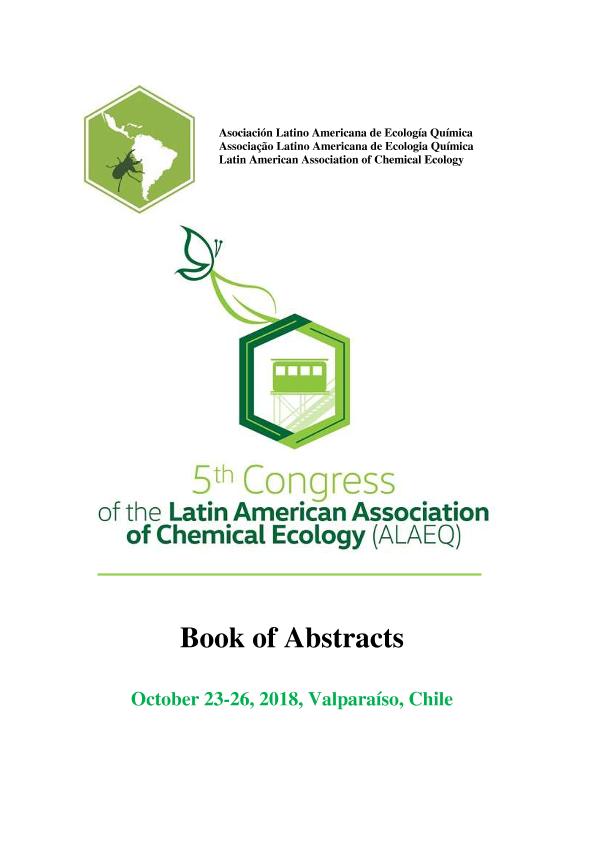Evento
Attacked Citrus Plants Release Synomones that Attract an Egg Parasitoid, Cosmocomoidea annulicornis (Hymenoptera: Mymaridae)
Manzano, Carolina ; Coll Araoz, Maria Victoria
; Coll Araoz, Maria Victoria ; Luft Albarracin, Erica Beatriz
; Luft Albarracin, Erica Beatriz ; Fernandez, Patricia Carina
; Fernandez, Patricia Carina
 ; Coll Araoz, Maria Victoria
; Coll Araoz, Maria Victoria ; Luft Albarracin, Erica Beatriz
; Luft Albarracin, Erica Beatriz ; Fernandez, Patricia Carina
; Fernandez, Patricia Carina
Tipo del evento:
Congreso
Nombre del evento:
5th Congress of the Latin American Association of Chemical Ecology
Fecha del evento:
23/10/2018
Institución Organizadora:
Asociación Latinoamericana de Ecología Química;
Título del Libro:
Book of Abstracts: 5th Congress of the Latin American Association of Chemical Ecology
Editorial:
Pontificia Universidad Católica de Valparaíso
Idioma:
Inglés
Clasificación temática:
Resumen
It is known that hymenopteran parasitoids generally use a combination of host kairomones and plant induced synomones to locate their hosts. Cosmocomoidea annulicornis (Hymenoptera: Mymaridae) is an egg parasitoid frequently found attacking eggs masses of Tapajosa rubromarginata (Hemiptera: Cicadellidae), a xylem-feeding sharpshooter vector of Xylella fastidiosa, the bacteria that causes Variegated Citrus Chlorosis. In the present study, we evaluated the volatile attraction capacity of citrus plants induced solely by feeding damage of T. rubromarginata, without egg masses, to investigate whether plant volatiles alone could act as cues for host finding. Newly emerged G. annulicornis (< 12 h), naïve females were used for behavioral assays with Y tube olfactometer dual choice tests (n=40). For the induced treatment, Citrus plants (2 years plants, Citrus aurantium var. 75AB, a variety used for grafting lemon trees) were kept in voile fabric bags along with 15 males of T. rubromarginata (to avoid oviposition of females) for 24 h before measurements. Non-induced treatment consisted of healthy citrus plants. Females were offered: (a) Air (control) versus Non-induced plants and (b) Non-induced plants versus Induced plants. Wasps had no preferences between the choices offered in the first experiment (a) (p>0.05), however, when wasps were offered Non-induced plants versus Induced plants, 67.5% parasitoids chose plants attacked by T. rubromarginata. Plant volatiles were isolated and analyzed according to the procedure described by Braccini et al (2015). Non-induced plants produced almost exclusively limonene, whereas induced plants produced a more complex monoterpene mixture. Based on these results, T. rubromarginata feeding damage induces plant synomones, that would be important in C. annulicornis host searching behavior.
Palabras clave:
SEMIOCHEMICALS
,
EGG PARASITOID
,
CITRUS
Archivos asociados
Licencia
Identificadores
Colecciones
Eventos(PROIMI)
Eventos de PLANTA PILOTO DE PROC.IND.MICROBIOLOGICOS (I)
Eventos de PLANTA PILOTO DE PROC.IND.MICROBIOLOGICOS (I)
Citación
Attacked Citrus Plants Release Synomones that Attract an Egg Parasitoid, Cosmocomoidea annulicornis (Hymenoptera: Mymaridae); 5th Congress of the Latin American Association of Chemical Ecology; Valparaíso; Chile; 2018; 1-2
Compartir



